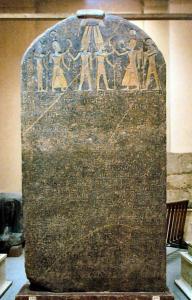There are many great Bible lessons to learn from studying the story of Joshua and the walls of Jericho.
Joshua Bible Character Summary
Joshua was one of the two faithful witnesses who spied the land of promise in the Old Testament but the other 10 witnesses were afraid to cross over the River Jordan and so the Israelites remained in the wilderness another 40 years because they feared man which really meant they didn’t trust God. After Moses’ death, Joshua became the leader of Israel and took them across to the land that God had promised Abraham, Isaac, and Jacob hundreds of years earlier. Joshua was a leader chosen by God Himself and publicly announced by Moses to be Israel’s leader. One thing about Joshua is that he never promoted himself as a leader; he simply followed God’s commands and served under Moses faithfully for more than 40 years proving himself faithful, trustworthy, and obedient to all that God commanded him. Joshua is an arch-type of Jesus Christ as he led the people into the Promised Land and served the Lord with diligence and without complaint all the days of his life. His words today still reverberate with powerful meaning as the father of his home by saying in his final days, “as for me and my house, we will serve the Lord” (Joshua 24:15).
The City-State of Jericho
Jericho was a city-state that lay in the eastern provinces of the Promised Land but it had to go because it was fully given over to paganism and was a center for worship for innumerable false gods and God did not want any trace of idolatrous people’s living where the Israel was to worship only God. Jericho is thought to mean “Moon City” and it naturally related to a pagan god. Moreover, Jericho stood between and all that God has promised Israel so here is a breakdown of the events leading up to the fall of Jericho in Joshua chapter six.
6:1-2 “Now Jericho was tightly shut because of the sons of Israel; no one went out and no one came in. The Lord said to Joshua, “See, I have given Jericho into your hand, with its king and the valiant warriors.”
Notice that Israel had cutoff and encircled the city prior to their marching around it. They had isolated it from any possible escape and even before the city was to fall, God had already declared that He had “given Jericho into” the hands of Israel, including its king and the valiant warriors. By God saying “See, I have given Jericho into your hand” He was declaring victory before the walls ever came down, even before the marching started, indicating that victory is fully a work of God and not of man. God was teaching Israel to see things as God does…as if they already are before it comes to be…to see with the eyes of faith. It mattered little to God that it was a heavily fortified city-state with fierce, experienced warriors that God called “valiant,” meaning they were fearless, courageous warriors.
6:3-5 “You shall march around the city, all the men of war circling the city once. You shall do so for six days. Also seven priests shall carry seven trumpets of rams’ horns before the ark; then on the seventh day you shall march around the city seven times, and the priests shall blow the trumpets. It shall be that when they make a long blast with the ram’s horn, and when you hear the sound of the trumpet, all the people shall shout with a great shout; and the wall of the city will fall down flat, and the people will go up every man straight ahead.”
The number six is the number of mankind for he was created on this same day but the number seven has significance in the Bible as it’s symbolic of a totality of perfection or completeness like the seven-day week and on the seventh day the city would fall down flat and then the people were to take the city straight away. Imagine walking around a major, fortified city for six days. The sound of the trumpet along with the loud shout may be an expression of God’s time to perform His mighty deed and the walls being flattened allowed the Israelites to march into the city from every side which may be another reason they had encircled the city-state.
6:9-11 “The armed men went before the priests who blew the trumpets, and the rear guard came after the ark, while they continued to blow the trumpets. But Joshua commanded the people, saying, “You shall not shout nor let your voice be heard nor let a word proceed out of your mouth, until the day I tell you, ‘Shout!’ Then you shall shout!” So he had the ark of the Lord taken around the city, circling it once; then they came into the camp and spent the night in the camp.
The priests blew the trumpets but the people held their shouts until given the word indicating that they had to wait for God and the ark of the Lord is representative of His very presence with His people and so Christians today have to often wait for God to do what He desires to do in their lives but even before He does, He is still present with them.
6:12-14 ”Now Joshua rose early in the morning, and the priests took up the ark of the Lord. The seven priests carrying the seven trumpets of rams’ horns before the ark of the Lord went on continually, and blew the trumpets; and the armed men went before them and the rear guard came after the ark of the Lord, while they continued to blow the trumpets. Thus the second day they marched around the city once and returned to the camp; they did so for six days.”
In time, the people in Jericho had to begin to wonder about their future for the word had spread about the miracles of God and they had come to be feared by those nations who had engaged with the Israelites. Joshua didn’t delay as he and the priests took the ark (symbolic of God’s presence) with them and did so early in the morning, which indicates that this was their priority. They did this for six days and possibly even the Israelites themselves must have begun to wonder how and when this would end, something the residents of Jericho must have also been thinking about.
6:15-17 “Then on the seventh day they rose early at the dawning of the day and marched around the city in the same manner seven times; only on that day they marched around the city seven times. At the seventh time, when the priests blew the trumpets, Joshua said to the people, “Shout! For the Lord has given you the city. The city shall be under the ban, it and all that is in it belongs to the Lord; only Rahab the harlot and all who are with her in the house shall live, because she hid the messengers whom we sent.”
God spared Rahab who had helped Israel by hiding the spies which shows that God extends grace to those outside of the nation of Israel just as today. God is no respecter of persons and anyone can be saved because salvation is a matter of grace and not by race. For certain, this was a victory given by God who “has given the city” to them as He had promised in the beginning, showing that before things are, God sees them as already having been accomplished for He has the effectual power to bring about all that He wills and purposes. The outcome was as good as done before it even happened and “So the people shouted, and priests blew the trumpets; and when the people heard the sound of the trumpet, the people shouted with a great shout and the wall fell down flat, so that the people went up into the city, every man straight ahead, and they took the city” (Joshua 6:20).
Jericho and Archeological Finds
The walls of Jericho were nothing like we might see in castles today. The walls were six feet thick and up to 26 feet high and sat atop a 46 foot embankment making the city almost impregnable. A German excavation of the site found that all of the walls had collapsed, with the exception of one small section that was still standing on what would have been about 8 feet above the ground. Could this have been the only place left standing(Sellin and Watzinger 1973: 58) where Rahab was spared who had hide the Israelite spies)? During the excavations, they discovered that the citizens had dwellings within the walls themselves. They also discovered that the walls had collapsed and had fallen straight down (Joshua 6:5) and that hundreds of thousands of mud bricks from the city’s wall must have come crashing straight down to the ground level, falling to the base of the retaining walls (Italian-Palestinian excavation, 1997, location 8.), just as God had foretold (Joshua 6:20). Not only that, but the entire city had burned (Joshua 6:24) with walls and floors blacked and reddened by fire (Kenyon 1981: 370).
Conclusion
The account of the walls of Jericho falling down is one of human improbability and God’s ability. It is not just a story in the Bible but an actual, historical account that mathces closely to what archeologists have excavated. Joshua may have been the leader of the nation but its true leader was God. In fact, the Hebrew name Joshua means “Jehovah is salvation” or “God saves” so it is appropriate that Jesus’ name is the short form of the Hebrew name Jehoshua and so Jesus means “God saves” or “The Lord is Salvation” or in short, “the Savior” so it is basically has the same meaning as Joshua. In fact, in Hebrew, Joshua’s and Jesus’ name is pronounced “Yaw-SHOO-uh.”
If you have not come to a personal relationship with Jesus then you have no relationship with God at all. It is only through Jesus Christ that one can gain access to the Father in heaven (John 6:44) and if anyone comes to Christ in faith after repentance, then Jesus says to them “I will raise him up on the last day.” That last day will be either joining Christ in the Kingdom of Heaven forever or forever being separated from Him with no second chance (Rev 20:11-15). If you choose to believe, then you already have eternal life (John 3:16-17) but if not, you’ll stand condemned for all time (John 3:18). Joshua’s words from the ancient of days still echo as relevant today as the day they were spoken where he said “choose for yourselves today whom you will serve” (Joshua 24:15) but if you reject God’s Son, Jesus Christ then “He will not forgive your transgression or your sins” (Joshua 24:19).
Another Reading on Patheos to Check Out: What Did Jesus Really Look Like: A Look at the Bible Facts
 Article by Jack Wellman
Article by Jack Wellman
Jack Wellman is Pastor of the Mulvane Brethren church in Mulvane Kansas. Jack is also the Senior Writer at What Christians Want To Know whose mission is to equip, encourage, and energize Christians and to address questions about the believer’s daily walk with God and the Bible. You can follow Jack on Google Plus or check out his book Blind Chance or Intelligent Design available on Amazon
Kenyon, K.M. 1957 Digging Up Jericho. London: Ernest Benn. 1981 Excavations at Jericho, Vol. 3. London: British School of Archaeology in Jerusalem.
Sellin, E., and Watzinger, C. 1973 Jericho die Ergebnisse der Ausgrabungen. Osnabrück: Otto Zeller, reprint of 1913 edition.












